Secular Books Relating to Cults and High-Demand Groups
These books are recommended for their relevance to understanding these phenomena; we do not necessarily endorse all the contents.
Non-Fiction
 Take Back Your Life: Recovering from Cults and Abusive Relationships
Janja Lalich and Madeleine Landau Tobias (both former cult
members). This is a comprehensive book which takes the former group
member through all the necessary healing stages. It is both clear
and compassionate, and is one of the few books on our list that
deals at length with both sexual abuse, and children in cults. An
excellent, excellent book. It is now
available as an audiobook,
and several excerpts are
available online.
Take Back Your Life: Recovering from Cults and Abusive Relationships
Janja Lalich and Madeleine Landau Tobias (both former cult
members). This is a comprehensive book which takes the former group
member through all the necessary healing stages. It is both clear
and compassionate, and is one of the few books on our list that
deals at length with both sexual abuse, and children in cults. An
excellent, excellent book. It is now
available as an audiobook,
and several excerpts are
available online.
 The
Lucifer Effect, Phillip Zimbardo. In 1971 Dr. Zimbardo
conducted a famous experiment at Stanford University. He divided a
group of college students into "prisoner" and "guards", and recorded
their behavior over the course of a week. Tom Maddux says, "In this
recent book,
The Lucifer Effect, Zimbardo uses what was learned in this
experiment to shed light on many incidents in history including the
Abu Ghraib prison abuse scandal. He concludes that in just about any
group of people there are factors present in human personalities
that can be activated by placing the person in the right conditions.
I think that this goes a long way to explain the way the Assembly
leadership developed and behaved, as well as the response of those
subject to their influence."
The
Lucifer Effect, Phillip Zimbardo. In 1971 Dr. Zimbardo
conducted a famous experiment at Stanford University. He divided a
group of college students into "prisoner" and "guards", and recorded
their behavior over the course of a week. Tom Maddux says, "In this
recent book,
The Lucifer Effect, Zimbardo uses what was learned in this
experiment to shed light on many incidents in history including the
Abu Ghraib prison abuse scandal. He concludes that in just about any
group of people there are factors present in human personalities
that can be activated by placing the person in the right conditions.
I think that this goes a long way to explain the way the Assembly
leadership developed and behaved, as well as the response of those
subject to their influence."
Dangerous Persuaders, Louise Samways, a free online ebook, 86 pages. This is a succinct, thorough and excellent explanation of how people are drawn into abusive organizations, how the mind control works, and what it takes to get free. Highly recommended! A must-read for everyone who has been in a controlling group.
 Influence: The Psychology of Persuasion , Dr. Robert
Cialdini. All guests at Wellspring watch a video of Dr.
Cialdini presenting the principles in this book. It's amazing to
learn how someone like G. Geftakys used these same concepts
on us.
Influence: The Psychology of Persuasion , Dr. Robert
Cialdini. All guests at Wellspring watch a video of Dr.
Cialdini presenting the principles in this book. It's amazing to
learn how someone like G. Geftakys used these same concepts
on us.
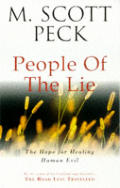 People of the Lie: Hope for Healing Human Evil
M. Scott Peck. Peck's concept of evil is not intended to be
theological; rather, it clarifies the nature of malignant
narcissism, and so offers a very useful category for understanding
George Geftakys.
People of the Lie: Hope for Healing Human Evil
M. Scott Peck. Peck's concept of evil is not intended to be
theological; rather, it clarifies the nature of malignant
narcissism, and so offers a very useful category for understanding
George Geftakys.
 Recovery from Cults:
Help for Victims of Psychological and Spiritual
Abuse
Michael D. Langone, ed. 22 contributors write on the topics of
mind control, leaving cults, facilitating recovery and special
issues. Especially helpful are the chapters on "Guidelines for
Families", "Guidelines for Ex-members", "Children and Cults",
and the chapters on mind control.
Recovery from Cults:
Help for Victims of Psychological and Spiritual
Abuse
Michael D. Langone, ed. 22 contributors write on the topics of
mind control, leaving cults, facilitating recovery and special
issues. Especially helpful are the chapters on "Guidelines for
Families", "Guidelines for Ex-members", "Children and Cults",
and the chapters on mind control.
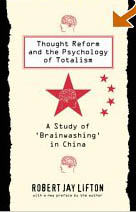 Thought Reform and the Psychology of Totalism: A Study of
Bainwashing in China Robert Jay Lifton. This continues to
be an essential work for understanding the not only the techniques of mind
control that continue to be utilized by authoritarian governments as well as
by destructive cults, but the subtle psychological effects on those on whom
it is practiced. Everyone is assigned to read it at Wellspring. At first you think, "This is about China in the 1950's - how
is this relevant to my situation?" But as you read people's descriptions in their own words about how their thinking was
changed, and how the changes persisted even after they were released, you start thinking, "That's me! This is so amazing!"
Thought Reform and the Psychology of Totalism: A Study of
Bainwashing in China Robert Jay Lifton. This continues to
be an essential work for understanding the not only the techniques of mind
control that continue to be utilized by authoritarian governments as well as
by destructive cults, but the subtle psychological effects on those on whom
it is practiced. Everyone is assigned to read it at Wellspring. At first you think, "This is about China in the 1950's - how
is this relevant to my situation?" But as you read people's descriptions in their own words about how their thinking was
changed, and how the changes persisted even after they were released, you start thinking, "That's me! This is so amazing!"
Personal Stories
 Leaving the Saints: How I Lost the Mormons and Found My Faith,
Martha Beck. A daughter of the Mormon Church's chief apologist
recounts how she and her husband left the LDS a few years ago. Martha
is a good writer and this riveting tale reads like fiction.
There are similarities here to the
Assembly that are absent from Brethrenism: the Mormons' apple-pie
niceness, the sparkling cleanliness, the many children, the grow-a
garden and bake-your-own-bread domesticity, plus disaster
preparedness and the Franklin planner! Did G and B imbibe more from
the Mormons than they would ever admit? Remember, before the Assembly they used to drive to Utah once a month
to go witnessing.
Leaving the Saints: How I Lost the Mormons and Found My Faith,
Martha Beck. A daughter of the Mormon Church's chief apologist
recounts how she and her husband left the LDS a few years ago. Martha
is a good writer and this riveting tale reads like fiction.
There are similarities here to the
Assembly that are absent from Brethrenism: the Mormons' apple-pie
niceness, the sparkling cleanliness, the many children, the grow-a
garden and bake-your-own-bread domesticity, plus disaster
preparedness and the Franklin planner! Did G and B imbibe more from
the Mormons than they would ever admit? Remember, before the Assembly they used to drive to Utah once a month
to go witnessing.
 Combatting Cult Mind Control , Steven Hassan. As a
former member of the Moonies, Steve provides an inside view of cult
life--its seductions, its abuses, and the deep psychological
disturbances and personality changes it can cause. He tells the
chilling story of his own recruitment and indoctrination; the
painful realization that he had been lied to, manipulated, and
robbed of his identity; and the long ordeal of returning to a
normal, healthy life. Much as we may not want to believe it, his
discussion of mind control is very pertinent to the Assembly and
other Christian ministries. His
approach is very balanced, caring and insightful.
Combatting Cult Mind Control , Steven Hassan. As a
former member of the Moonies, Steve provides an inside view of cult
life--its seductions, its abuses, and the deep psychological
disturbances and personality changes it can cause. He tells the
chilling story of his own recruitment and indoctrination; the
painful realization that he had been lied to, manipulated, and
robbed of his identity; and the long ordeal of returning to a
normal, healthy life. Much as we may not want to believe it, his
discussion of mind control is very pertinent to the Assembly and
other Christian ministries. His
approach is very balanced, caring and insightful.
The Boston Movement: Critical Perspectives on the International Churches of Christ, Carol Giambalvo & Herbert L. Rosedale, Editors. Lots of personal experiences with remarkable similarities to Assembly stories. The chapter on "An Examination of the Boston Movement in Relation to Thought Reform Criteria" is especially good.
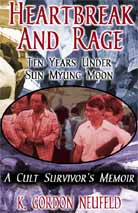 K.
Gordon Neufeld spent ten years in the Unification Church. After leaving, he
completed an M. A. in creative writing, and wrote a
book,
Heartbreak and Rage: Ten Years under Sun Myung Moon, a Cult Survivor's
Memoir. The
introduction to the book contains an excellent
explanation of mind control that discards the image of "mindless robots" and
incorporates instead the very helpful concept of "mental roadblocks".
K.
Gordon Neufeld spent ten years in the Unification Church. After leaving, he
completed an M. A. in creative writing, and wrote a
book,
Heartbreak and Rage: Ten Years under Sun Myung Moon, a Cult Survivor's
Memoir. The
introduction to the book contains an excellent
explanation of mind control that discards the image of "mindless robots" and
incorporates instead the very helpful concept of "mental roadblocks".
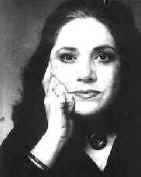 Visions of Glory: A History and
a Memory of Jehovah's Witnesses
Barbara Grizzuti Harrison. This book is both a history of the
JW's, and the personal story of the author's childhood in the
Watchtower Society in the 1950's and her escape as a teenager.
Amazing parallels with the Assembly.
Visions of Glory: A History and
a Memory of Jehovah's Witnesses
Barbara Grizzuti Harrison. This book is both a history of the
JW's, and the personal story of the author's childhood in the
Watchtower Society in the 1950's and her escape as a teenager.
Amazing parallels with the Assembly.
Fiction
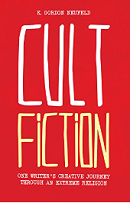
K. Gordon Neufeld, the former Moonie (see above), also wrote Cult Fiction: One Writer's Creative Journey Through an Extreme Religion" in which he analyzes several twentieth century novels that "capture the essence of totalitarian regimes". He includes George Orwell's 1984, Arthur Koestler's Darkness at Noon, One Man's Bible by Gao Xingjian, Three Continents by Ruth Prawar Jhabvala, Oyster by Jannette Turner Hospital, Heavenly Deception by Maggie Brooks and Joseph Conrad's Heart of Darkness. He also mentions Cat's Eye (Atwood), Invisible Man (Ellison), Imaginary Friends (Lurie), A Darker Place (Laurie King), Animal Farm (Orwell), Foreigner (Rachlin), and Mind Games (Spinrad). Books like this shed light on what was wrong with the Assembly system itself, as distinct from what was wrong with George & Betty specifically.
 Animal Farm, George Orwell, 1954.
The animals take over Manor Farm, and everything is done with zealous
equality. Too soon, however, the pigs, who have styled themselves leaders by
virtue of their intelligence, succumb to the temptations of privilege and
power and elevate themselves above their brethren. "The whole management and
organization of the farm depend on us. Day and night, we are watching over
your welfare."
And thus they begin to lord it over the other animals, who are soon left
hungry and exhausted.
Animal Farm, George Orwell, 1954.
The animals take over Manor Farm, and everything is done with zealous
equality. Too soon, however, the pigs, who have styled themselves leaders by
virtue of their intelligence, succumb to the temptations of privilege and
power and elevate themselves above their brethren. "The whole management and
organization of the farm depend on us. Day and night, we are watching over
your welfare."
And thus they begin to lord it over the other animals, who are soon left
hungry and exhausted.
